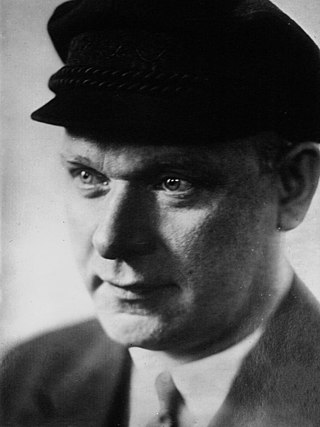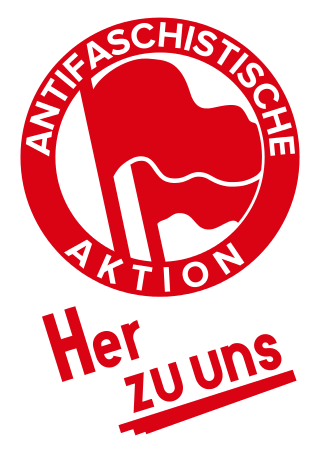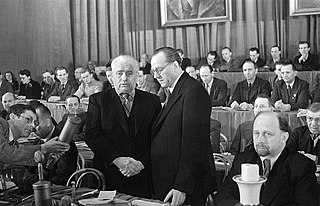External links
Films directed by Kurt Maetzig | |
|---|---|
|
| | This article related to a German film of the 1940s is a stub. You can help Wikipedia by expanding it. |
| Einheit SPD-KPD | |
|---|---|
| Directed by | Kurt Maetzig |
Release date |
|
Running time | 20 minutes |
| Country | East Germany |
| Language | German |
Einheit SPD-KPD is an East German short subject documentary film about the merging of the Communist Party of Germany (KPD) and the Social Democratic Party of Germany (SPD) into the Socialist Unity Party of Germany (SED), directed by Kurt Maetzig. It was released in 1946.

The Social Democratic Party of Germany is a social democratic political party in Germany. It is one of the major parties of contemporary Germany.

The Communist Party of Germany was a major far-left political party in the Weimar Republic during the interwar period, an underground resistance movement in Nazi Germany, and a minor party in West Germany during the postwar period until it was banned by the Federal Constitutional Court in 1956.

Ernst Johannes Fritz Thälmann was a German communist politician and leader of the Communist Party of Germany (KPD) from 1925 to 1933.
In the fourteen years the Weimar Republic was in existence, some forty parties were represented in the Reichstag. This fragmentation of political power was in part due to the use of a peculiar proportional representation electoral system that encouraged regional or small special interest parties and in part due to the many challenges facing the nascent German democracy in this period.

Federal elections were held in Germany on 6 November 1932. The Nazi Party saw its vote share fall by four percentage points, while there were slight increases for the Communist Party of Germany and the national conservative German National People's Party. The results were a great disappointment for the Nazis, who lost 34 seats and again failed to form a coalition government in the Reichstag. The elections were the last free and fair elections before the Nazis seized power the following year.

Federal elections were held in Germany on 14 September 1930. Despite losing ten seats, the Social Democratic Party of Germany (SPD) remained the largest party in the Reichstag, winning 143 of the 577 seats, while the Nazi Party (NSDAP) dramatically increased its number of seats from 12 to 107. The Communists also increased their parliamentary representation, gaining 23 seats and becoming the third-largest party in the Reichstag.

Antifaschistische Aktion was a militant anti-fascist organisation in the Weimar Republic started by members of the Communist Party of Germany (KPD) that existed from 1932 to 1933. It was primarily active as a KPD campaign during the July 1932 German federal election and the November 1932 German federal election and was described by the KPD as a "red united front under the leadership of the only anti-fascist party, the KPD."

The Social Democratic Party in the GDR was a reconstituted Social Democratic Party existing during the final phase of East Germany. Slightly less than a year after its creation it merged with its West German counterpart ahead of German reunification.
The Internationaler Sozialistischer Kampfbund or ISK was a socialist split-off from the SPD during the Weimar Republic and was active in the German Resistance against Nazism.
Willi Eichler was a German journalist and politician with the Social Democratic Party of Germany (SPD).
Eduard Wald was a Communist politician, trade unionist and member of the German Resistance against Nazism.
The Conciliator faction was an opposition group within the Communist Party of Germany during the Weimar Republic and the Third Reich. In East Germany, after World War II, the German word for conciliator, Versöhnler, became a term for anti-Marxist political tendencies.

Heinz Neumann was a German politician from the Communist Party (KPD) and a journalist. He was a member of the Communist International, editor in chief of the party newspaper Die Rote Fahne and a member of the Reichstag. He was one of the many victims to Stalin's Great Purge.

The East German branches of the Communist Party of Germany (KPD) and the Social Democratic Party of Germany (SPD) merged to form the Socialist Unity Party of Germany (SED) on 21 April 1946 in the territory of the Soviet occupation zone. It is considered a forced merger. In the course of the merger, about 5,000 Social Democrats who opposed it were detained and sent to labour camps and jails.
Sozialistische Einheit was a newspaper published from Berlin, Germany in 1946. The newspaper began publishing twice-weekly on 14 March 1946. It newspaper was issued by the Greater Berlin Organization Committee of Social Democratic Party of Germany (SPD) and the Communist Party of Germany (KPD). The editorial office of Sozialistische Einheit was based in the SPD headquarters on Behrenstrasse in East Berlin.
Lydia Poser was a German politician of the KPD and SED and widow of the executed Communist official Magnus Poser.
Antifa is a political movement in Germany composed of multiple far-left, autonomous, militant groups and individuals who describe themselves as anti-fascist. According to the German Federal Office for the Protection of the Constitution and the Federal Agency for Civic Education, the use of the epithet fascist against opponents and the view of capitalism as a form of fascism are central to the movement. The antifa movement has existed in different eras and incarnations, dating back to Antifaschistische Aktion, from which the moniker antifa came. It was set up by the then-Stalinist Communist Party of Germany (KPD) during the late history of the Weimar Republic. After the forced dissolution in the wake of Machtergreifung in 1933, the movement went underground. In the postwar era, Antifaschistische Aktion inspired a variety of different movements, groups and individuals in Germany as well as other countries which widely adopted variants of its aesthetics and some of its tactics. Known as the wider antifa movement, the contemporary antifa groups have no direct organisational connection to Antifaschistische Aktion.

Hermann Matern was a German communist politician (KPD) and high ranking functionary of the Socialist Unity Party of Germany in the German Democratic Republic.

Einheit – Zeitschrift für Theorie und Praxis des Wissenschaftlichen Sozialismus was the theoretical journal of the Socialist Unity Party of Germany.